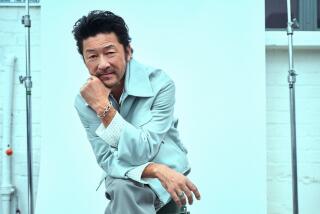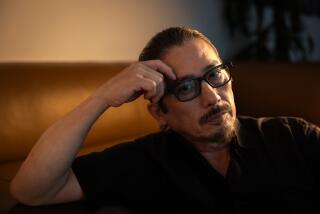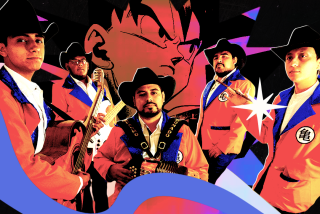‘Naruto’ by Masashi Kishimoto
- Share via
Although it’s received little attention in the mainstream media, Masashi Kishimoto’s “Naruto” may be the most popular Japanese property to hit the U.S. since “Pokémon.” It was the first manga to make the USA Today bestseller list, and there are more than 85 million volumes in print worldwide. Two animated series ran for more than 300 episodes, and “Naruto” merchandise ranges from Cosplay costumes and video games to headbands and watches. In Yahoo’s top 10 searches of 2008, “Naruto” ranked No. 7 -- behind Britney Spears and Barack Obama but ahead of Angelina Jolie and “American Idol.”
The series’ main character, ninja-in-training and self-proclaimed knucklehead Naruto Uzumaki, has little in common with American comic book heroes. The saga opens with him in trouble again, this time for scrawling graffiti on the Mount Rushmore-like monument to the previous Hokage (or chieftain) of the Village Hidden in the Leaves. He’s at the bottom of his class at the Ninja Academy and has already failed the final exam twice. He’d rather get into mischief than study.
Sealed within Naruto’s body is a nine-tailed fox-demon, a monster that nearly destroyed the village until the previous Hokage imprisoned it in the newborn boy. Naruto grew up an orphan and outcast, but he dreams of becoming Hokage someday. After finally graduating from the academy, Naruto begins his ninja training in earnest. He acquires a teacher, the understated Kakashi, and teammates Sakura Haruno, whom Naruto immediately falls for, and a rival, the icily talented Sasuke Uchiha.
Through a series of difficult lessons, missions and tests, Naruto learns to perform magical jutsu (techniques) by channeling his spirit energy. His lessons include creating doppelgängers, walking on water and summoning powerful spirits. In extreme circumstances, he can draw on the power of the demon trapped within his body.
As Kishimoto’s narrative progresses, the main story comes into focus. Orochimaru, one of the deadliest criminals in ninja history, has mastered a forbidden jutsu that confers immortality. But the evil ninja needs a new body every few years -- before the old one decays completely. Orochimaru sees Sasuke as the ideal vessel for his soul. Sasuke, who desires power to avenge his murdered parents, succumbs to the temptation. Naruto vows to prevent his comrade from being consumed by Orochimaru.
As his vow suggests, Naruto’s good heart makes him appealing and keeps him from becoming a jerk. He’s ferociously loyal to his friends and wants to grow strong to protect the people dear to him in the hidden village. Naruto’s unflagging enthusiasm and his understanding of what it means to be lonely even wins over his foes.
Gaara, a ninja from another village who fights with clouds of enchanted sand, begins as a cold-hearted killer. But his encounters with Naruto show him the error of his ways, and he learns to embrace his humanity. Harry Potter never changed Draco Malfoy’s character, nor did Batman reform the Joker.
Kishimoto considers Akira Toriyama’s hit manga “Dragon Ball” a major influence on his work. Although both artists favor bold lines and massed areas of black over half-tone grays, Kishimoto’s drawings are less cartoon-y. His human characters reflect an accurate knowledge of anatomy and stand solidly on their feet. Kishimoto may use extreme point-of-view angles or exaggerated perspective to energize an action scene, but he doesn’t distort the characters. If Naruto punches an enemy -- or gets punched -- the reader can feel the blow land.
Volume No. 27 concludes the first story arc: Naruto failed in his initial attempt to bring Sasuke back to the village hidden in the leaves and got the sushi kicked out of him. His new teacher, Jiraiya, one of the village’s greatest ninjas, has three years to raise Naruto’s skills to the level that will make him a shinobi, a full-fledged ninja. Naruto swears he will apply himself and gain the power to bring Sasuke home. But he’s not ready to abandon his knuckleheaded ways.
Jiraiya concludes: “You are a certain kind of fool . . . that is true. And a fool as great as you are may well be able to handle this.” Millions of readers are waiting to see how their favorite fool handles those next challenges.
Solomon’s most recent book is “Disney Lost and Found: Exploring the Hidden Artwork From Never-Produced Animation.”
More to Read
The biggest entertainment stories
Get our big stories about Hollywood, film, television, music, arts, culture and more right in your inbox as soon as they publish.
You may occasionally receive promotional content from the Los Angeles Times.










